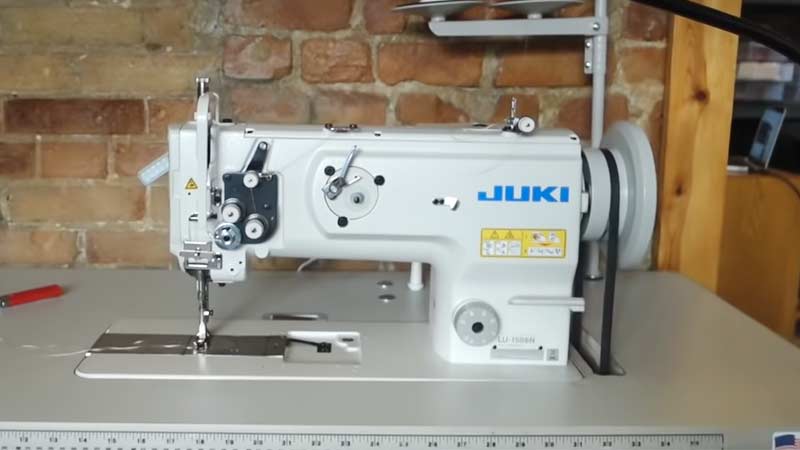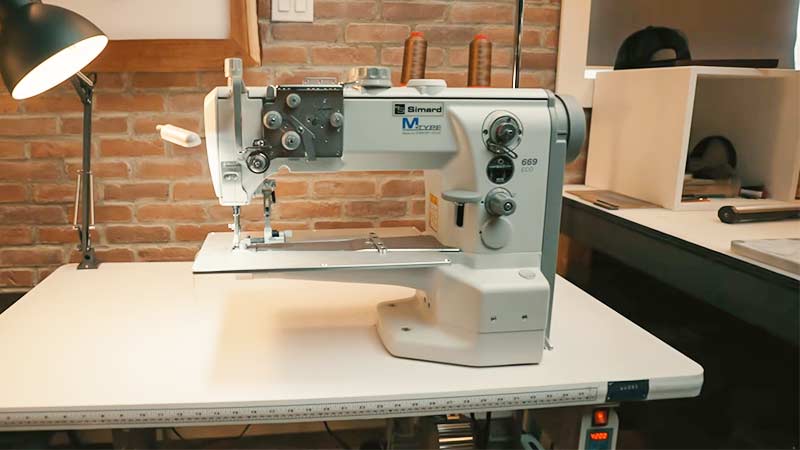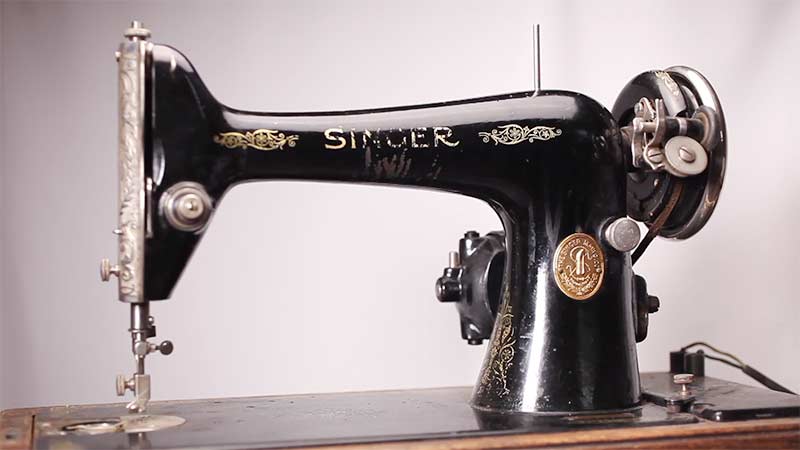The Aldens 120 sewing machine, a vintage marvel produced in the 1950s and 1960s, encapsulates a blend of nostalgia, craftsmanship, and practicality.
Determining the worth of an Aldens 120 involves assessing various factors. Each element contributes to its overall value, from its brand recognition and model rarity to the machine’s age, condition, and unique features.
As an embodiment of a bygone era’s charm and functionality, the Aldens 120 appeals to collectors and sewing enthusiasts alike.
This introduction sets the stage for exploring the intricate details that influence this iconic sewing machine’s monetary and sentimental value.

What Is an Aldens 120 Sewing Machine Worth?
Generally, The value of an Aldens 120 sewing machine ranges from $50 to $500. The value of an Aldens 120 sewing machine is contingent upon various factors, primarily its condition, rarity, and demand in the market.
However, a specific model like the vintage Aldens DeLuxe sewing machine, complete with a pedal, was listed at $179.99 on Bonanza, highlighting its perceived worth.
Condition plays a pivotal role in determining the sewing machine’s value; well-preserved units often command higher prices.
Additionally, rarity and demand within the collector’s market can significantly impact the machine’s monetary worth.
Limited availability and heightened interest among enthusiasts can elevate its value beyond the average range.
Ultimately, the fluctuating market dynamics, coupled with the unique features of the Aldens 120 sewing machine, contribute to its appraisal, emphasizing the importance of considering various elements when assessing its monetary value.
Features of an Aldens 120 Sewing Machine

The Aldens 120 sewing machine, a vintage gem from the 1950s and 1960s, continues to captivate sewing enthusiasts with its timeless charm and practical features.
Crafted by the Aldens company, later acquired by Singer, this machine boasts a blend of affordability, reliability, and versatility.
Let’s delve into the distinctive features that make the Aldens 120 a cherished choice for sewing aficionados:
Zigzag Stitch Function
The Aldens 120’s zigzag stitch function is a standout feature, offering many possibilities for sewing enthusiasts.
This versatile capability enables users to effortlessly handle stretch fabrics, making it ideal for garments that demand flexibility.
Additionally, the machine excels in crafting appliques, seamlessly sewing buttonholes, and creating intricate decorative stitches.
This functionality transforms the Aldens 120 into a true workhorse, ready to tackle various projects precisely and efficiently.
Drop Feed Dog Mechanism
Crafted with creative freedom in mind, the drop-feed dog mechanism of the Aldens 120 empowers users to explore various artistic avenues.
By effortlessly lowering the feed dogs, the machine becomes an invaluable tool for free-motion quilting, embroidery, and darning.
This feature facilitates the creation of intricate designs. It adds a personal touch to every stitch, making the Aldens 120 a preferred choice for those seeking to infuse their projects with unique and personalized details.
Reverse Stitch Lever
Including a reverse stitch lever in the Aldens 120 enhances the durability and strength of your sewing projects.
This feature allows for seamless sewing in reverse, providing a practical way to reinforce seams and create secure locking stitches.
With the ability to effortlessly backtrack, users can confidently add an extra layer of resilience to their creations, ensuring that each stitch withstands the test of time.
Stitch Length Regulator
Precision is the hallmark of the Aldens 120, thanks to its stitch length regulator. This feature empowers users to fine-tune the length of their stitches, ranging from 6 to 30 stitches per inch.
The level of control offered by this regulator ensures that every stitch aligns with the user’s preferences, providing adaptability to different fabrics and sewing styles.
Whether working on delicate fabrics or heavy materials, the Aldens 120 delivers consistent, high-quality stitching.
Stitch Width Regulator
Impeccable zigzag stitching is achievable with the Aldens 120’s stitch width regulator. This feature allows users to adjust the width of zigzag stitches, ranging from 0 to 5 mm.
Whether working on intricate details that demand precision or broader embellishments that require a wider stitch, this control enhances the machine’s versatility.
The ability to customize the width ensures that the Aldens 120 remains a reliable companion for various creative endeavors, offering flexibility in design execution.
Tension Dial
The Aldens 120 gives users precise control over stitching outcomes through its tension dial.
This essential feature allows for fine-tuning the tension of the upper thread, a crucial adjustment when working with diverse fabrics and thread types.
Achieving consistent and balanced stitching results becomes seamless, ensuring that the Aldens 120 delivers optimal performance across a spectrum of sewing projects.
Bobbin Winder
Efficiency meets convenience with the Aldens 120’s automatic bobbin winder. Activated with a simple press of the foot pedal, this feature transforms the often tedious task of winding bobbins into a quick and hassle-free process.
The automatic bobbin winder is a time-saving addition that keeps sewing projects running smoothly, allowing users to focus on their creative endeavors without interruption.
Spool Pin
Ensuring a smooth and consistent thread feed to the machine, the Aldens 120’s spool pin is critical for uninterrupted sewing.
This feature securely holds the thread spool in place, preventing snags or disruptions during stitching.
Users can confidently engage in their creative pursuits with the reliable spool pin, knowing that the Aldens 120 provides a seamless and reliable thread delivery system.
Presser Foot Lifter
Simplify fabric handling with the Aldens 120’s presser foot lifter, an essential tool for streamlining the insertion and removal of fabrics.
This functionality enhances user-friendliness by effortlessly raising and lowering the presser foot.
This feature makes navigating through different stages of the sewing process smoother, contributing to a more enjoyable and efficient sewing experience.
Needle Plate with Markings
Precision stitching is more accessible with the Aldens 120’s needle plate featuring markings for seam allowances and needle positions.
This thoughtful addition aids in achieving accurate and consistent seam widths throughout various projects.
The needle plate with markings is a practical tool that enhances the machine’s usability, particularly for those who prioritize meticulous stitching in their sewing endeavors.
Illuminating Light
Elevating visibility within the sewing area, the Aldens 120 is equipped with a built-in illuminating light.
This feature ensures the workspace is well-lit, reducing eye strain and allowing for more accurate stitching.
Whether working on intricate details or larger projects, the illuminating light adds comfort and precision, making the Aldens 120 an ideal choice for those who value a well-lit and visually optimized sewing environment.
Are Old Sewing Machines Worth Anything?

Old sewing machines, especially those manufactured by reputable brands or those with unique features, can hold considerable value.
Several factors contribute to the worth of an old sewing machine, making them sought after by collectors, hobbyists, and vintage enthusiasts.
Here are critical considerations regarding the value of old sewing machines:
Brand and Model
Sewing machines have a rich history, and certain brands and models stand out for their enduring reputation for quality craftsmanship.
Brands like Singer, Pfaff, and Bernina have established themselves as industry leaders, and their sewing machines often hold higher value in the collector’s market.
Beyond the brand, specific models may achieve iconic status due to innovative features, groundbreaking technology, or a unique design.
These iconic models contribute significantly to specific sewing machines’ collectible status and elevated market value.
Age and Rarity
The age of a sewing machine can significantly influence its value, especially if it hails from the late 19th to early 20th centuries.
Machines from this era are often considered antiques, prized for their historical significance and craftsmanship reflective of the period. Rarity is another critical factor that impacts value.
Limited production runs, discontinued models, or those featuring unique and distinctive features become highly sought after by collectors, contributing to their rarity and elevated market value.
Condition
The overall condition of a sewing machine is a critical determinant of its value. Well-preserved machines with minimal wear, intact decals, functioning parts, and original paintwork are highly coveted by collectors.
The presence of any damage, rust, or missing components may significantly affect the machine’s value.
Professionally restored sewing machines can command higher prices, especially when restoration emphasizes authenticity, preserving the original design and features.
Functionality
The functionality of a sewing machine is paramount to its value. Machines that can still perform their intended functions, even if not in regular use, tend to be more valuable than non-functional ones.
Collectors and hobbyists often appreciate machines that can still produce stitches reliably.
Additionally, sewing machines with diverse stitches and attachments are particularly desirable, especially for those who intend to use them for practical sewing tasks.
Decorative or Collectible Appeal
Some old sewing machines are valued more for their aesthetic appeal and decorative elements than their practical use.
Machines featuring ornate designs, unique craftsmanship, or intricate detailing may become highly collectible.
Vintage sewing machines housed in decorative cabinets or cases are often sought after by those interested in incorporating them into vintage home decor, adding an extra layer of appeal beyond their functional capabilities.
Local Demand and Trends
The local demand for old sewing machines can significantly influence their value. Certain regions may have a higher concentration of collectors, creating a localized market that affects prices.
Additionally, current trends in vintage or retro aesthetics may influence the desirability and value of specific sewing machine models.
Understanding these regional and trend-based influences provides valuable insights into the market dynamics.
Documentation and Accessories
Original documentation, such as manuals, accessories, or additional attachments, can substantially enhance the value of a sewing machine. Machines with well-preserved manuals or rare accessories often command higher prices.
Documentation that proves a machine’s history or previous ownership adds to its provenance, further enhancing its appeal to collectors and contributing to its overall value.
FAQs
Are Alden 120 sewing machines considered collectibles?
Aldens 120 sewing machines are often considered collectibles due to their vintage status, unique features, and association with historical craftsmanship.
Does the working condition affect the value of an Aldens 120 sewing machine?
Yes, the working condition is a significant factor in determining the value of an Aldens 120. Machines that are in good working order are generally more valuable.
How does the brand reputation contribute to the value of an Aldens 120 sewing machine?
Aldens 120 sewing machines are associated with reputable brands like Singer. Brand recognition enhances their value, as these brands are known for quality craftsmanship.
Can the decorative appeal of an Aldens 120 sewing machine impact its worth?
Yes, the presence of decorative or ornate elements, unique craftsmanship, and well-preserved paintwork can enhance the decorative appeal and, consequently, the overall value of the machine.
To Recap
The worth of an Aldens 120 sewing machine extends beyond its monetary value, encapsulating a rich blend of historical significance, craftsmanship, and functional appeal.
As a vintage gem from the mid-20th century, the Aldens 120 holds both nostalgic and practical value for sewing enthusiasts and collectors.
Assessing its worth involves meticulously considering factors such as brand reputation, model rarity, condition, and unique features.
Whether viewed as a collector’s item or a functional piece of sewing history, the Aldens 120 sewing machine remains a testament to enduring craftsmanship and a cherished artifact with intrinsic and sentimental value for those who appreciate the beauty of vintage sewing technology.
Leave a Reply